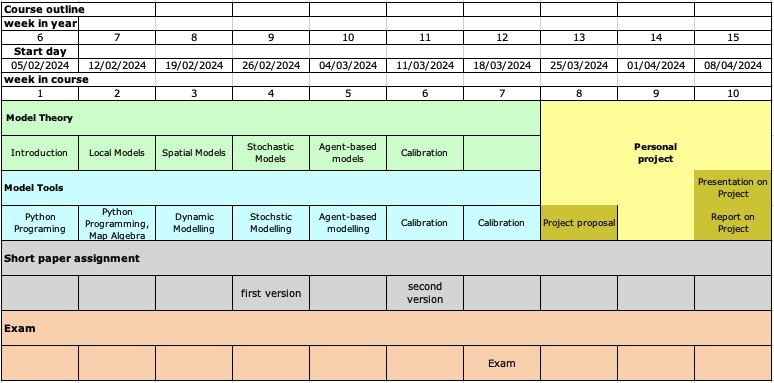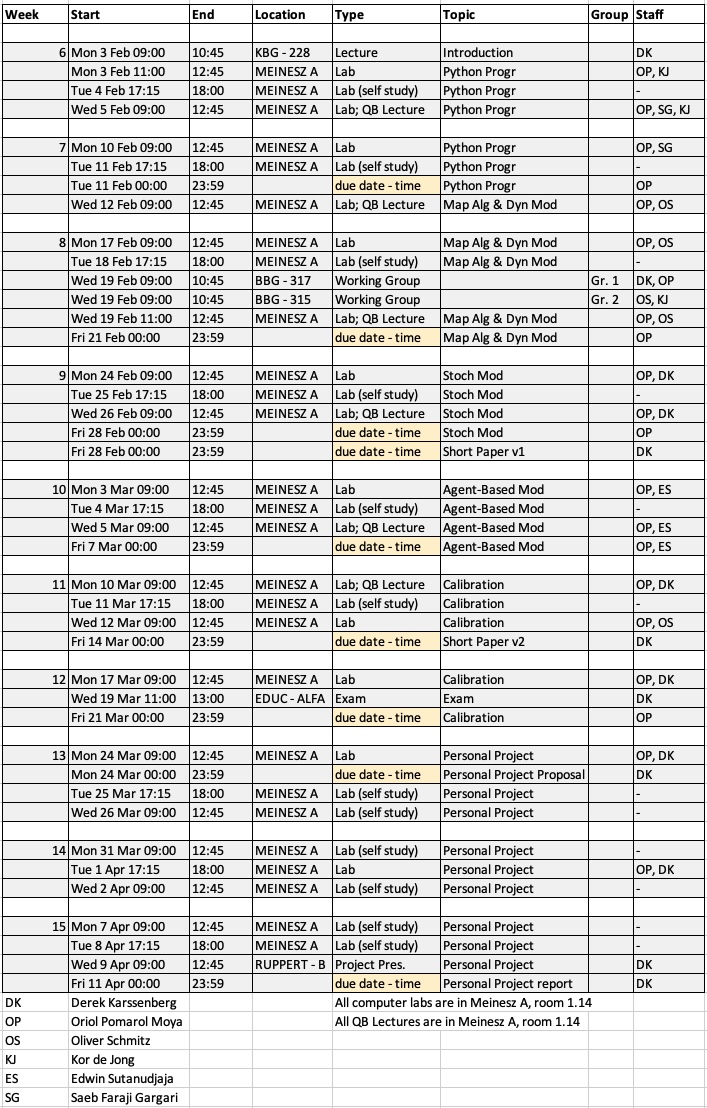1. Course information¶
1.1. General information¶
Name of course: Land Surface Process Modelling
Course Code: GEO4-4406
ECTS: 7.5
Category / Level: M (Master)
Teaching period: 3
Contact hours: appr. 8 h / week
Language of instruction: English
1.2. Lecturers¶
1.3. Place in curriculum¶
The course provides a theoretical and practical basis of spatio-temporal (process-based) modelling of land surface processes, and is relevant for all disciplines related to land surface processes (hydrology, land degradation, geomorphology, natural hazards, ecology). In addition it provides a background in geoinformatics which is relevant for appropriate use of modelling tools and GIS.
1.4. Required background¶
Knowledge of geography, geosciences, or a related field at an MSc level.
1.5. Entry requirements¶
You must have study entrance permit.
1.6. Aims and content¶
1.7. Course outline (time table)¶
Course outline and schedule are provided in this document. Locations subject to change, please refer to https://mytimetable.uu.nl for updated information.
As shown in the outline of the course in the table below, the course consists of two components, Model Theory and Model Tools. These are run parallel in time. Model theory contains e-lectures, a working group meeting, and a paper assignment. Model Tools is taught mainly using computer practicals. At the end of the course you will do a personal project, consisting of case study modelling work, a written report, and oral presentations. The detailed course schedule below gives the date and location of lectures, working groups, and computer practicals. It also provides due dates for the computer practicals and other assignments.
1.8. Calculation of final mark & rubrics¶
For passing the course students need to:
Submit answers to the questions of all computer labs, preferably before the deadline of each lab as indicated in the timetable.
Active participation in working group session.
Hand-in short paper assignment and report on the personal project before the deadline.
Get a final mark of 5.5 or higher.
The final mark M is calculated as:
M = 0.1A + 0.6B + 0.1C + 0.2D
with A, the mark for the short paper assignment; B, the mark for the exam; C, the mark for the oral presentation on the case study (final presentation); and D, the mark for the written report on the personal project. A, B, C, and D are not rounded.
Absence (for instance as a result of illness or family circumstances) during the exam or the working group session must be agreed with the coordinator of the course in advance by phone or email. In addition please fill out and submit the form at https://fd21.formdesk.com/universiteitutrecht-geo/AW_AbsenceForm.
If you get ill during the course resulting in delays (e.g. computer lab work) please do inform the coordinator of the course and we will find a solution.
The course has been passed if the final grade is >=5.5 and all obligations have been fulfilled. If not, and only if 1) the final grade is 4.00 or higher and 2) all obligations have been fulfilled, a supplementary test (or repeat exam) can be offered. If the supplementary test has been successfully passed, the final grade of the course will be 6.0.
For details on the above and further information, see the OER (Education and Examination Regulations).
A rubric is used for marking the personal project (report and presenation). It can be downloaded here.
1.9. Individual and group work¶
For some parts of the course you will work in groups:
Computer Labs: group of 2 students
Short Paper Assignment: group of 2 students
Working Group: group of 3 students
Case Study: group of 3 students
Please self-subscribe for each of these four groups in Blackboard (Course Content section).
1.10. Question based lectures¶
Slides of the question based lectures are at https://surfdrive.surf.nl/files/index.php/s/cxyStl6DEHCcy04 (as soon as they are available).
1.11. Study material¶
For the exam, you need to study:
All material indicated in this document as ‘Literature for exam’. You can download this as one PDF (or order it as a printed syllabus, recommended) from Blackboard.
Think Python, An introduction to software design, 2nd Edition (!), A. Downey, 2015, Green Tea Press, Needham, 222 pp. Chapters 1, 2, 3, 5, 6, 7, 8, 10, and 14. Online at http://greenteapress.com/wp/think-python-2e/ or order a print from Blackboard.
All computer practicals to the extend that you need to understand the core concepts of the tools.
All e-lectures.
Note that material indicated in this document as ‘Reading material’ is background material only. It is recommended to read through this but it is not a requirement for the exam.
1.12. Exam¶
The written exam (individual test) will take place on campus (on paper):
The exam will be open book. During the exam, you are allowed to use any source of (online or offline) information except information that you get from other persons. It is not allowed to use Large Language Models (e.g., ChatGPT) to generate answers. If you would like to use digital or online information please bring your laptop.
Study the study material as described in the studyguide.
Two days before the exam you will receive a research paper. The paper will be on the design or use of a simulation model. Read through the paper 2 or 3 times to be sure you understand it. See below on how the paper is used in the exam.
The exam will contain a few questions that you need to answer in the context of the paper that you received (see above). For instance: Is the model used in the paper you read a physically-based model or a conceptual model? (note that I will not ask this particular question). So the questions will be general, but in the context of the paper. In addition the exam will contain normal (and open, not multiple choice questions, for instance) on the study materials.
The following document will give you an impression of the type of questions included in the exam.
1.13. OSIRIS information on the course¶
Additional information is available at https://www.osiris.universiteitutrecht.nl/osistu_ospr/StartPagina.do
1.14. Form of teaching¶
The course is run largely following the flipped-teaching model. The idea of flipped teaching is that contact time between student and tutor is not used for explaining theory but mainly for discussion and questions related to the theory. To make this work, it is important you study the learning materials before attending a Question Based Lecture. The time schedule of our course supports this approach to learning. Each week, you will study you particular topic. The first days of the week, or if possible even the week before, it is strongly recommended to study the learning materials related to this topic. This includes pre-recorded e-lectures as well as literature. On Wednesday (not all weeks, refer to course time table in this course guide), then, we have the Question Based Lecture during which you can ask questions or particular concepts can be discussed. Your are asked to prepare for this Question Based Lecture by compiling a list of questions.
The components of the course are:
Recorded e-lectures, you can listen to these anytime
Literature, sections from books or scientific articles
Question Based Lectures, weekly meeting for questions on study materials, theory or anything important to the course
Computer Labs, scheduled computer labs with supervision, on campus
Lecture, introductionary lecture at the start of the course
Working group session
Short paper assignment
Personal project including a final presentation and written report
Communication is through:
Questions and discussion during Lab hours on campus
E-mail, for other questions, e-mail the course coordinator
Blackboard, used for uploading your answers to questions in the labs and other assignments
1.15. Disclaimer¶
In case of unforeseen circumstances, it may be necessary to make last minute changes to the course compared to what has been described in this manual. E.g. lectures or exams may be held online or an exam may be replaced by an assignment. The course coordinator will keep students up to date with the latest information.

